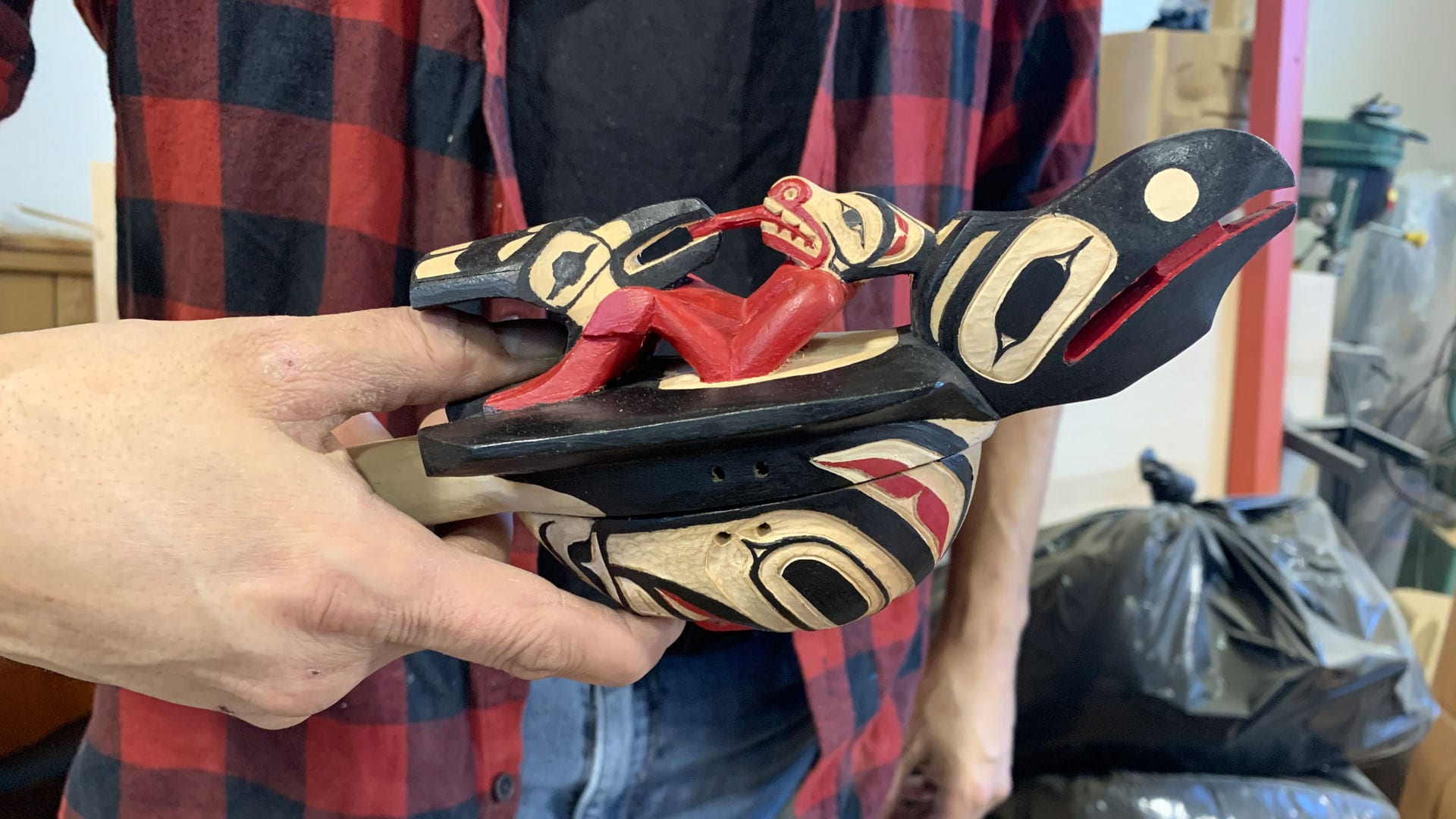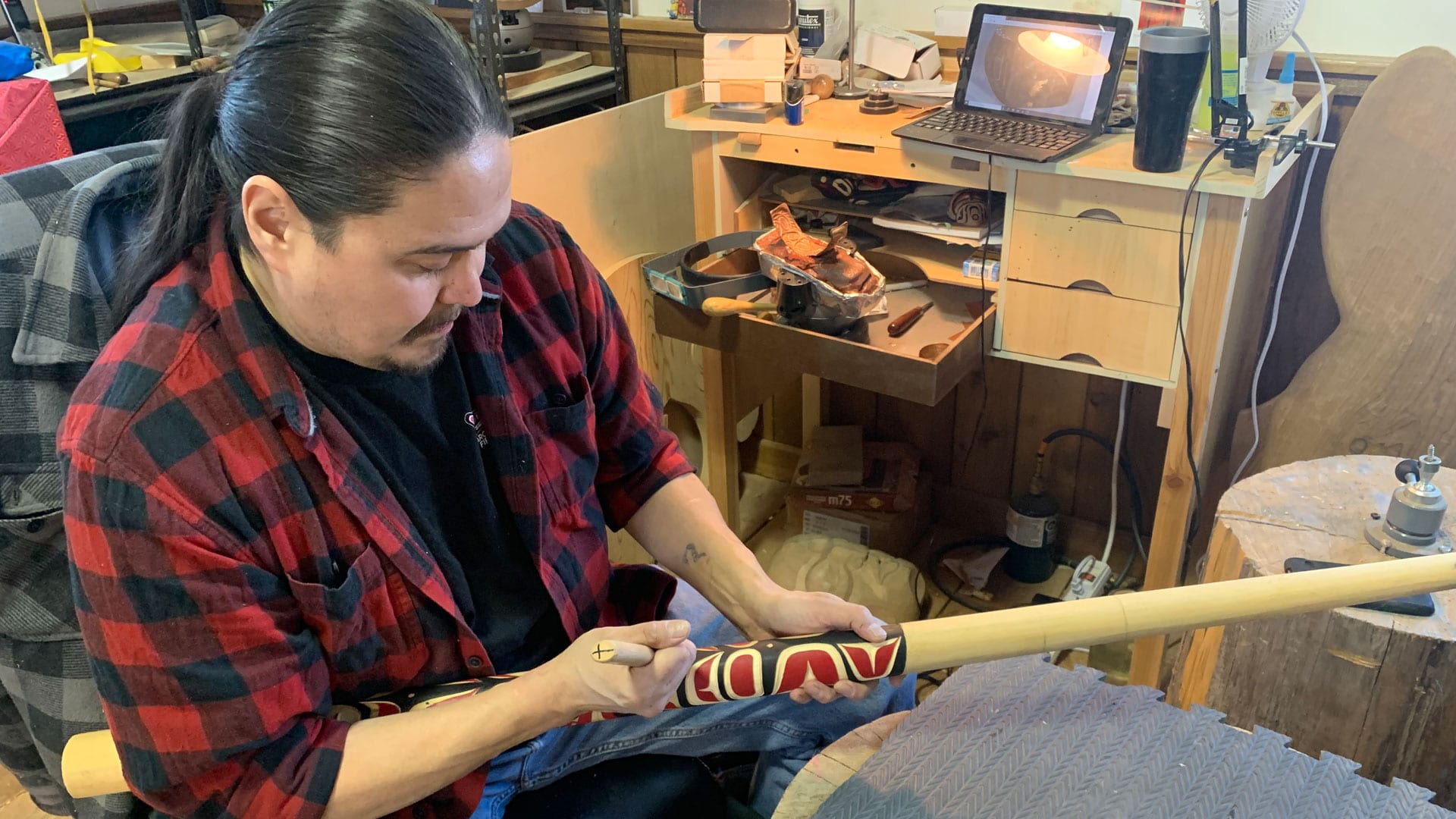Thomas Fawcett sits in his studio surrounded by wood – and the carvings that come from his heart and hands.
He’s is a highly regarded carver for Carcross/Tagish First Nation (C/TFN) in the Yukon.
It’s a career path he never thought would be possible – especially considering that just a few years ago, he was considering taking his own life.
“I just feel really blessed. Instead of the F-word like I used to say in the morning, I say ‘thank you.’”
Fawcett, 44, was born in Fort St. James, B.C., and is of the Dakhl’aweidi Clan (Tlingit).
After a painful operation several years ago, he found himself addicted to drugs and living on Vancouver’s notorious Downtown Eastside.
“I got addicted to heroin and meth. Then you just kind of wind up on the street because you don’t spend any money on anything else but that.”
He says the experience almost caused him to lose hope.
“I was ready to commit suicide I was in so much pain and suffering,” he recalls.

Suicidal and with nowhere to go, in 2016 Fawcett went to a housing office for people looking to get off the streets. While he wasn’t eligible for housing, an employee there asked him if there was anywhere else he could go.
Before he knew it, Fawcett found himself on a bus to the Yukon.
He then hitchhiked to Carcross, a small community of 300 an hour outside of Whitehorse. His mother, Rose James, a Northwest Coast Tlingit printmaker, was a citizen of Carcross/Tagish First Nation (C/TFN).
When recalling how he returned to his mother’s community unexpectedly, he cracks a smile.
“When I walked into the C/TFN government building everyone was pretty freaked out because they hadn’t seen me in years,” he laughs.
While meeting with a C/TFN post-secondary officer, Fawcett was asked what he wanted to do career-wise.
“I said, well, the only thing I was good at was art.”

Artistically talented from a young age, Fawcett dabbled in jewelry making and silversmithing and sold some of his pieces to galleries in Vancouver.
But before he could pursue higher education, he needed to complete his grade 10 science and math.
“The reason I became an artist was I’m no good at math,” he laughs.
“So I sweat and suffered. I’d get bleeding noses in the math class and stuff but I actually got a B+ and whizzed the science one.”
With support from C/TFN, Fawcett was accepted into the Frieding Diesing School of North West Coast Art in Terrace, B.C.
He was 42 at the time.
“I never thought I’d go back to school. I thought that was out of reach for me.”

He then returned to Carcross and was offered a job in the carving shed, where he now works full-time alongside master carver Keith Wolf-Smarch, helping him carve totem poles and other large pieces.
Fawcett is also a talented engraver and jewelry maker, and takes commissions from community members to create Northwest Coast Tlingit inspired designs.
Now five years drug-free, he credits carving and community support with his sobriety.
“Doing this art my mind just turns off, the clock just disappears and then it’s time to go home. I’m like, ‘I don’t want to go to home, I’m carving!”
“I have my own house now. All this stuff happened to me in a period of four years so my head is still spinning. I never really had time to sit down and be proud of myself.”
Fawcett hopes to bring back traditional Northwest Coast Tlingit art to the community, like grave markers and potlatch masks – something he never thought he’d be able to do.
“I want people to have pride in our artwork and our jewelry, and just having the regular items in their houses.”
He also wants to give back to the First Nation that’s helped him, like providing carving lessons to anyone in the community who’s willing to learn.
While Fawcett says some days are still a struggle, he says his community – and his job – give him strength to keep on the right track.
“It’s really good healing, it’s therapy. It’s healed me so much from all the trauma that I’ve had in my life.”









